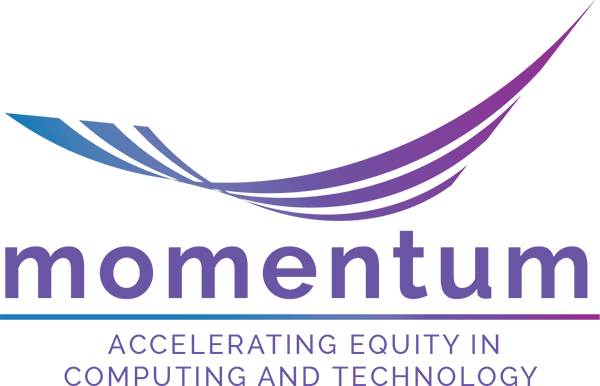
MOMENTUM
Our work at Momentum is inspired by the reality that, despite growing demand for a technologically-trained workforce and increasing popularity of tech majors and careers, women and people of color remain marginalized in tech fields, with many equity gaps actually becoming larger with time.
Momentum aims to accelerate equity in computing and technology through the generation of new knowledge about what works (and what does not) in diversifying the tech workforce, with a special focus on educational pathways.
Simply put, it is critical to achieve greater Momentum.

New Enrollment and Degree Attainment Data
Over the past seven years, UCLA’s Momentum (formerly known as BRAID Research) has studied the BRAID initiative, a broadening participation in computing (BPC) effort co-led by AnitaB.org and Harvey Mudd College. The team collected undergraduate computing enrollment and degree attainment (EDA) data, broken out by gender and race/ethnicity, to examine whether and to what extent BRAID institutions narrowed participation gaps. Click the button below to learn more.

Update on Collaboration with the Center for Inclusive Computing
The CIC Baseline Survey resulted in more than 9,000 student responses, yielding a 25% response rate. In exploring sense of belonging for students in our sample, we found gender and racial/ethnic variation in students who reported “Feeling like an outsider in the computing community.” Students who are Black, Latinx, or from multi-racial/ethnic categories were generally more likely to report feeling like an outsider than were their Asian or White peers. Further, women and students identifying as genderqueer or gender non-conforming were more likely than men to describe an outsider status in their computing community.

RESEARCH ON
AP CS PRINCIPLES
Working with our colleagues at the University of Oregon, the Momentum team has conducted research on the characteristics of students who take AP CS Principles and whether taking that course (versus the traditional AP CS “A” course) predicts longer-term interest in computing majors or careers. Findings show that although the “Principles” course enrolls a more diverse group of students, the course is less likely than the traditional course to predict students’ aspirations for majors or careers in computing and technology.
